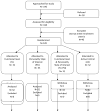A randomized clinical trial of theory-based activities for the behavioral symptoms of dementia in nursing home residents
- PMID: 21649633
- PMCID: PMC3381903
- DOI: 10.1111/j.1532-5415.2011.03449.x
A randomized clinical trial of theory-based activities for the behavioral symptoms of dementia in nursing home residents
Abstract
Objectives: To test the main and interactive effects of activities derived from the Need-Driven Dementia-Compromised Behavior model for responding to behavioral symptoms in nursing home residents.
Design: Randomized double-blind clinical trial.
Setting: Nine community-based nursing homes.
Participants: One hundred twenty-eight cognitively impaired residents randomly assigned to activities adjusted to functional level (FL) (n=32), personality style of interest (PSI) (n=33), functional level and personality style of interest (FL+PSI) (n=31), or active control (AC) (n=32).
Intervention: Three weeks of activities provided twice daily.
Measurements: Agitation, passivity, engagement, affect, and mood assessed from video recordings and real-time observations during baseline, intervention, random times outside of intervention, and 1 week after intervention.
Results: All treatments improved outcomes during intervention except mood, which worsened under AC. During intervention the PSI group demonstrated greater engagement, alertness, and attention than the other groups; the FL+PSI group demonstrated greater pleasure. During random times, engagement returned to baseline levels except in the FL group in which it decreased. There was also less agitation and passivity in groups with a component adjusted to PSI. One week after the intervention, mood, anxiety, and passivity improved over baseline; significantly less pleasure was displayed after withdrawal of treatment.
Conclusion: The hypothesis that activities adjusted to FL+PSI would improve behavioral outcomes to a greater extent than partially adjusted or nonadjusted activities was partially supported. PSI is a critical component of individualized activity prescription.
Trial registration: ClinicalTrials.gov NCT00388544.
© 2011, Copyright the Authors. Journal compilation © 2011, The American Geriatrics Society.
Conflict of interest statement
AK was supported by NIH grant R01 NR008910
Paul T. Costa receives royalties from the NEO-PI-R and the NEO-FFI and was supported in part by NIH Grant DAO26652
Figures
References
-
- Lyketsos CG, Sheppard JM, Steinberg M, et al. Neuropsychiatric disturbance in Alzheimer’s disease clusters into three groups: The Cache County Study. Int J Geriatr Psychiatry. 2001;16:1043–1053. - PubMed
-
- Rubin EH, Morris JC, Berg L. The progression of personality changes in senile dementia of the Alzheimer’s type. J Am Geriatr Soc. 1987;35(8):721–5. - PubMed
-
- Tractenberg RE, Weiner MF, Patterson MB, et al. Emergent psychopathology in Alzheimer’s disease patients over 12 months associated with functional, not cognitive, changes. J Geriatr Psychiatry Neurol. 2002;15:110–117. - PubMed
-
- Ballard C, Corbett A, Chitramohan R, et al. Management of agitation and aggression associated with Alzheimer’s disease: Controversies and possible solutions. Curr Opin Psychiatry. 2009;6:532–540. - PubMed
-
- Dyer CB, Pavlik VN, Murphy KP, et al. The high prevalence of depression and dementia in elder abuse or neglect. J Am Geriatr Soc. 2000;48:205–208. - PubMed
Publication types
MeSH terms
Associated data
Grants and funding
LinkOut - more resources
Full Text Sources
Other Literature Sources
Medical


